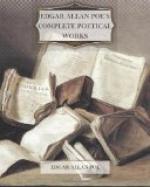I mean to say that the Deity does not create.
‘Oinos’.
Explain!
‘Agathos’.
In the beginning only, he created. The seeming creatures which are now throughout the universe so perpetually springing into being can only be considered as the mediate or indirect, not as the direct or immediate results of the Divine creative power.
‘Oinos.’
Among men, my Agathos, this idea would
be considered heretical in the
extreme.
‘Agathos.’
Among the angels, my Oinos, it is seen to be simply true.
‘Oinos.’
I can comprehend you thus far—that certain operations of what we term Nature, or the natural laws, will, under certain conditions, give rise to that which has all the appearance of creation. Shortly before the final overthrow of the earth, there were, I well remember, many very successful experiments in what some philosophers were weak enough to denominate the creation of animalculae.
‘Agathos.’
The cases of which you speak were, in
fact, instances of the secondary
creation, and of the only species
of creation which has ever been
since the first word spoke into existence
the first law.
‘Oinos.’
Are not the starry worlds that, from the
abyss of nonentity, burst
hourly forth into the heavens—are
not these stars, Agathos, the
immediate handiwork of the King?
‘Agathos.’
Let me endeavor, my Oinos, to lead you, step by step, to the conception I intend. You are well aware that, as no thought can perish, so no act is without infinite result. We moved our hands, for example, when we were dwellers on the earth, and in so doing we gave vibration to the atmosphere which engirdled it. This vibration was indefinitely extended till it gave impulse to every particle of the earth’s air, which thenceforward, and forever, was actuated by the one movement of the hand. This fact the mathematicians of our globe well knew. They made the special effects, indeed, wrought in the fluid by special impulses, the subject of exact calculation—so that it became easy to determine in what precise period an impulse of given extent would engirdle the orb, and impress (forever) every atom of the atmosphere circumambient. Retrograding, they found no difficulty; from a given effect, under given conditions, in determining the value of the original impulse. Now the mathematicians who saw that the results of any given impulse were absolutely endless—and who saw that a portion of these results were accurately traceable through the agency of algebraic analysis—who saw, too, the facility of the retrogradation—these men saw, at the same time, that this species of analysis itself had within itself a capacity for indefinite progress—that there were no bounds conceivable to its advancement and applicability, except within the intellect of him who advanced or applied it. But at this point our mathematicians paused.
‘Oinos.’




